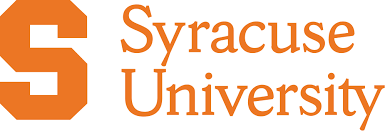

Syracuse University
Nutrition
Study detals
: Bachelor's degree : B.S. Nutrition : Full time : 36 MonthRequirements
If you have completed academic work outside the U.S., you must provide official academic credentials as well as English translations of the documents. If only one document is available, we will accept notarized or certified copies of the original document. If translations are needed, it is your responsibility to have the credentials translated by a reputable translation and evaluation service. Syracuse University will not provide translations for you. A key to the marking system or grading scale should also be included if it is not indicated on the transcript.
- First-year Students: Attending and graduating from in-person secondary schools based in the United States for at least three full academic years (Grades 10-12).
- Transfer Students: Have completed at least 24 credits in person at a post-secondary institution in the United States. Students must have earned a cumulative GPA of 3.0 or higher, excluding ESL curriculum.
English Language Requiements
- IELTS is not required. as part of the admission process all students will take the VEPT test administered by interlearn
- VEPT costs - (50$)
Pre-Sessional (20 weeks) 37 - 40
Pre-Sessional (12 weeks) 41 - 45
Pre-Sessional (6 weeks) 46 - 50
Inernational Year One - 51+
Speciality
International Year One in Available (47 200)
Please note that students completing the British curriculum are not eligible to apply upon completion of the IGCSE/GCSE; we require at least one additional year of education. Additionally, we do not accept the BTEC for admission at this time.
Progressing students into Syracuse University receive the following merit awards for each
subsequent year of enrollment based on the cumulative GPA earned upon the completion of the 30 credit hours:
• A GPA between 3.25 and 3.49 is $10,000 per year
• A GPA between 3.5 and 3.74 is $15,000 per year
• A GPA greater than 3.75 is $20,000 per year
Additional information
Degree Overview
Many nutrition professionals work in healthcare as part of patient care teams to prevent and treat illness. Others work with businesses, schools, and lawmakers to ensure all people have access to adequate nutrition, at school, at home, and at work. In every case, nutrition is an essential component of individual and public health.
Study Reasons
Accredited by the Accreditation Council for Education in Nutrition and Dietetics (ACEND) of the Academy of Nutrition and Dietetics
Prepares alumni to work in a variety of health and health promotion fields, many as registered dietitians.
Students also study nutrition in the health and lifespan, clinical nutrition therapy, community nutrition, nutrition education and counseling.